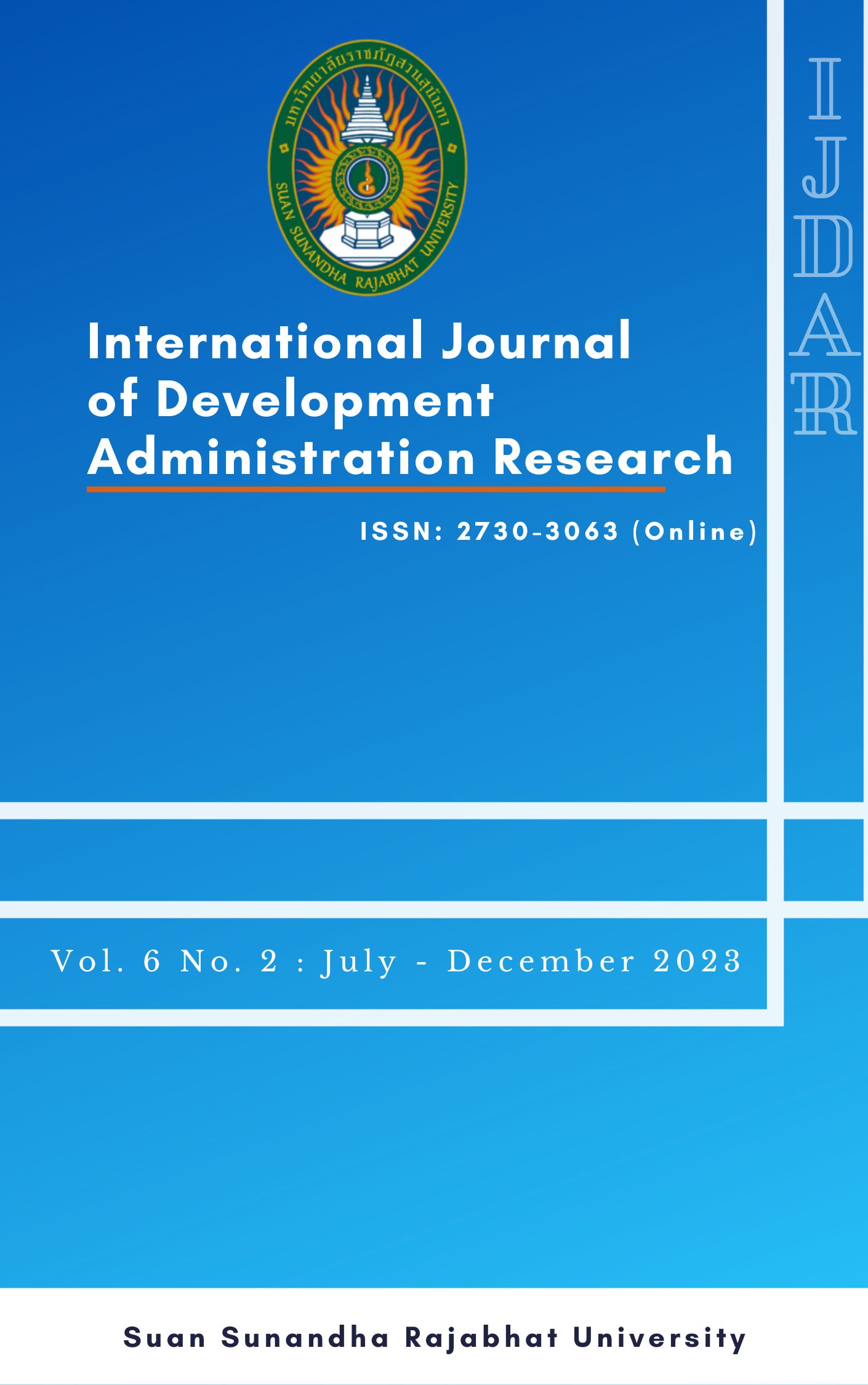Causal Relationship Model of Artificial Intelligence on Marketing Mix and Preparedness of Small and Medium Enterprises in Bangkok Metropolitan Area
Main Article Content
Abstract
The objective of this research was to understand the influence of technological, organizational and environmental (TOE) contexts in the adoption of AI in SMEs located in the Bangkok Metropolitan Area, where maximum businesses are concentrated. For this, the data was collected from 320 respondents employed in different SMEs. To facilitate this study, a structure with several variables, namely dependent (preparedness of SME), independent (technological, organizational and environmental) and mediating variable (marketing mix) was developed. PLS-SEM (Partial Least Squares Structural Equation Modeling) was utilized to explain the proposed hypothesis. It was revealed that the technological, organizational and environmental contexts were important in terms of adoption at leadership and individual level and overall openness to embrace technologies were effective in the adoption of AI in SMEs. Further, the mediating role of marketing mix indicates that use of AI-tools in the marketing strategy will support the adoption of AI. The study implies that the probability of adoption of AI in SMEs will be benefitted by a positive attitude towards the technology adoption, at organizational, individual, and leadership level adoption and system openness. The study has practical implications; it can be posited that Thai SMEs can effectively use AI to grow and operate multitude of activities in a smooth fashion in the competitive scenario where large and international firms have already started harnessing the benefits of AI. Additionally, in the current Covid-19 pandemic scenario, AI tools can allow remote access to services. Furthermore, the performance level of SME in the post adoption stage also needs exploration through future research works.
Article Details
License Terms
All articles published in this journal are licensed under the Creative Commons Attribution–NonCommercial–NoDerivatives 4.0 International License (CC BY-NC-ND 4.0).
Under this license, users are permitted to:
- Share — copy and redistribute the material in any medium or format.
Under the following conditions:
- Attribution (BY)
Users must give appropriate credit to the author(s) and the journal, provide a link to the license, and indicate if any changes were made. Attribution must not suggest endorsement by the author(s) or the journal.
- NonCommercial (NC)
The material may not be used for commercial purposes. Any use primarily intended for or directed toward commercial advantage or monetary compensation is prohibited without prior written permission from the copyright holder.
- NoDerivatives (ND)
If users remix, transform, translate, adapt, or build upon the material, they may not distribute the modified material. The work must be shared in its original and unaltered form.
This license ensures that published works remain freely accessible to the academic community and the public, while protecting the integrity of the original research and the rights of the author(s).
For the full legal code of this license, please visit:
https://creativecommons.org/licenses/by-nc-nd/4.0/
References
Brynjolfsson, E., & Mcafee, A. (2017). Artificial intelligence, for real. Harvard Business Review.
Reprint July 2017. Retrieved December 18, 2021 from
https://starlab-alliance.com/wp-content/uploads/2017/09/AI-Article.pdf
Chooprayoon, V. (2011). A study of factors influencing the adoption of E-Commerce
technology in small and medium enterprises (SMES) in the kingdom of Thailand. Doctoral dissertation, Murdoch University.
Chooprayoon, V., & Fung, C. C. (2010). TECTAM: an approach to study Technology
Acceptance Model (TAM) in gaining knowledge on the adoption and use of
e- commerce/e-business technology among small and medium enterprises in
Thailand. InTech, 31-38.
Corea, F. (2019). In F. Corea (Ed.). An Introduction to Data: Everything You Need to Know About AI, Big Data and Data Science. Springer International, 25–29.
Davenport, T. H., & Ronanki, R. (2018). Artificial intelligence for the real world. Harvard business review, 96(1), 108-116.
Haenlein, M., & Kaplan, A. (2019). A brief history of artificial intelligence: On the past, present, and future of artificial intelligence. California management review, 61(4), 5-14.
Hsiao, M. H. (2018). A conceptual framework for technology-enabled and technology-dependent user behavior toward device mesh and mesh app. Future Business Journal, 4(1), 130-138.
Kamishima, Y., Gremmen, B., & Akizawa, H. (2018). Can merging a capability approach with effectual processes help us define a permissible action range for AI robotics entrepreneurship? Philosophy of Management, 17(1), 97-113.
Kijsanayotin, B., Pannarunothai, S., & Speedie, S. M. (2009). Factors influencing health information technology adoption in Thailand's community health centers: Applying the UTAUT model. International journal of medical informatics, 78(6), 404-416.
Kitsios, F., & Kamariotou, M. (2021). Artificial Intelligence and Business Strategy towards Digital Transformation: A Research Agenda. Sustainability, 13(4), 2025.
Lai, Y., Sun, H., & Ren, J. (2018). Understanding the determinants of big data analytics (BDA) adoption in logistics and supply chain management: An empirical investigation. The International Journal of Logistics Management, 29(2), 676-703.
Leesa-Nguansuk, S. (2019). Thailand tops global digital rankings. Bangkok Post, 19 (February), B1.
Lyytinen, K., & Rose, G. M. (2003). The disruptive nature of information technology innovations: the case of internet computing in systems development organizations.
MIS quarterly, 27, 557-596.
Muriithi, S. M. (2017). African small and medium enterprises (SMEs) contributions, challenges and solutions. International Journal of Research & Reflection in Management Science, 5,
Phonthanukitithaworn, C., Sellitto, C., & Fong, M. W. L. (2015). User intentions to adopt mobile payment services: A study of early adopters in Thailand. Journal of Internet Banking and Commerce, 20(1), 1-29.
Sangiumpun, J. & Greif, D. (2019). Thailand: The Impact of Artificial Intelligence and its
possible effects on Thailand. Retrieved December 18, 2021 from https://www.lexology.com/library/detail.aspx?g=d461ecfc-a9ff-41d5-a270-92ac079e9369
Siddiqui, K., Bajwa, I., Elahi, M. A., & Fahim, S. M. (2016). Heuristics of applying statistical tests using appropriate measurement scales. Sci. Int. (Lahore), 28(5), 4433-4438.
Suebsin, C., & Gerdsri, N. (2010, July). Technology adoption: A case study of ERP
implementation in one of healthcare organizations in Thailand. In PICMET 2010
Technology management for global economic growth 1-8. IEEE.
Swanson, E. B. (1994). Information systems innovation among organizations. Management science, 40(9), 1069-1092.
Taiwo, M. A., Ayodeji, A. M., & Yusuf, B. A. (2012). Impact of small and medium enterprises on economic growth and development. American Journal of Business and Management, 1(1), 18-22.


